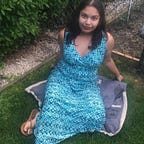Hi everyone! My name is Becca Sam and I’m super excited to be learning and growing alongside you all this semester! In the meantime, this post will serve as a way for you to get to know me better (beyond the tiny face you see in zoom sessions at least.)
A few fun facts I always start out with when introducing myself are:
- I’m a Leo; take that as you will
- I love cooking (I’d say I’m fairly decent but I might be biased)
- I practice yoga
- I just finished watching “Avatar: The Last Airbender” — — I’m currently looking for my next binge so definitely send me suggestions!
One important part of my identity is that I am a first generation Caribbean student in the class of 2023. Growing up in the diverse city of Yonkers, I have directly witnessed the effects of poverty, racism, sexism, educational inequality, and social movements within my community. As a result, my passion for political activism and social justice came naturally. With it, came my interest in how different elements of society fit together, interact, and influence each other. While at Colgate I plan to double major in Sociology and Women’s Studies with my ultimate goal being becoming a lawyer. Although I am a remote learner this semester, I continue to be a part of many organizations on campus such as Caribbean Students Association and Sisters of the Round Table. I currently work as an intern at Colgate’s Women’s Studies Center, where I am in the process of developing WMST 101 and Anti-racist podcasts. Furthermore, I also work as Professor Dominique C. Hill’s research assistant, where our focus is on carcerality and the experiences of Black girls in educational spaces.
It is my research on Black girls that drew me to this course. As someone who considers themselves a stakeholder in Black lives, I am interested in critiquing structures that deem certain lives more sacred than others. As stated by Patrisse Cullors, living in a society that has “literally allowed for us to believe and center only black death,” we sometimes forget how to imagine black life. In this course, I am specifically interested how those who inhabit a body marked as black have historically used religion as a form of empowerment and how these spiritual/healing practices have evolved in the contemporary era.
Because we are living in a time of extraordinary circumstances, we definitely have an interesting semester in store. One thing that would help foster my ideal learning environment is having general respect, patience and empathy for one another. I encourage myself and my peers to lean into the process of learning and unlearning; to be open to questioning what we know and how we know it. I also implore Professor Davenport to have patience with us; times are rough right now so showing up and being present might look different for different people. With that being said, while academics are important, I encourage everyone to try their best to take care of their mind, body, and spirit; patience with oneself is just as important.
Reflecting on “The Spiritual Work of Black Lives Matter” in which Patrisse Cullors and Robert Ross are in conversation, one part that stood out to me was when they highlighted the power of social media within the Black Live Matter Movement. Cullors asserts that social media has “allowed for a new conversation, a new reach.” As stated in Monday’s class, I view social media as a tool that not only broadcasts the BLM message and builds community, but forces reflection amongst the masses. Historically, denial has served as a means of maintaining power and acts as a form of white supremacy. What I call “knowingly not knowing” stems from white attachment to innocence and aversion to shame which ultimately results in violence enacted against Black folk. This happens in instances such as white people denying the past/events, or through the collective denial of white privilege, which ultimately benefits them. In our day and age social media is especially powerful because it makes denial a lot harder. With videos and hashtags that go viral on various platforms, people are confronted by the differing lived experiences of others and are forced to recognize many of the patterns in this world (ie. who is consistently being policed/losing their lives?). In an ideal situation, with this “awakening” comes accountability and change.
Through both podcasts, it is clear that Black Lives Matter is spiritual, healing work bigger than any one person; like a religion, it leads to the transformation of the souls of people who choose to devote themselves to it. Using Mazur and McCarthy’s criteria of religious analysis, one can argue that the fact that the movement is “comprised of communities with shared meanings and values, has the presence of ritualized behaviors, uses language of ultimacy and transcendence, and has ‘sacred’ times and spaces” is enough reason to consider it religious. Importantly, I build on Herling’s notion that even if the BLM didn’t have all of these things, it could be considered a religious entity in and of itself simply because it helps construct “worlds of meaning” for individuals.
I cannot wait to learn and discuss more with you all as a class! Stay safe!
